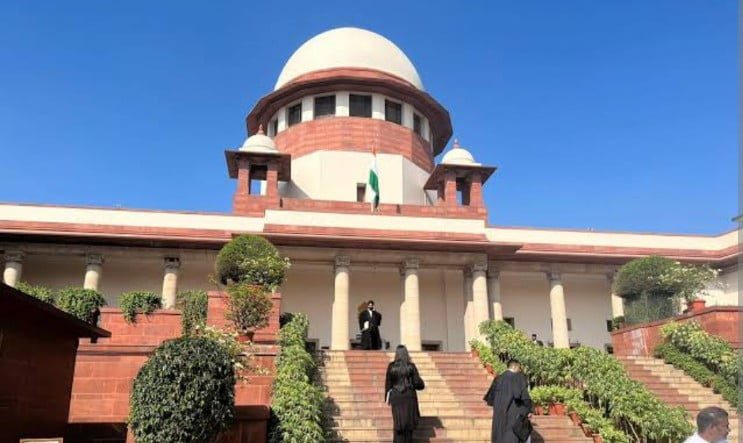In a pivotal legal development, the Supreme Court of India has upheld the bail granted to Jharkhand Chief Minister Hemant Soren by the Jharkhand High Court. This decision comes amidst a high-profile money laundering investigation and controversy surrounding alleged corruption.
Case Background and Legal Proceedings
On January 31, 2024, Hemant Soren, the Chief Minister of Jharkhand and leader of the Jharkhand Mukti Morcha (JMM), was arrested by the Enforcement Directorate (ED) in connection with an alleged land grab case. The arrest was part of a broader investigation into the illegal acquisition of land, with claims linking Soren to a syndicate involved in manipulating land records for illicit gains.
The Supreme Court was reviewing an appeal by the ED, which challenged the High Court’s decision to grant bail to Soren. The ED contended that Soren’s release on bail posed a risk of further criminal activity, arguing that his continued freedom could potentially lead to the commission of similar offences. The agency’s plea underscored concerns about the potential for interference with ongoing investigations and the risk of further illegal activities.
Soren’s legal team, however, presented a robust defense, arguing that the Chief Minister had been falsely implicated by the central agency. His lawyers contended that the charges against him lacked substantive evidence and were part of a broader pattern of political targeting. The single-judge bench of Justice Rongon Mukhopadhyay at the High Court had previously ruled in favor of Soren’s bail, stating that there was insufficient evidence to justify continued detention.
Allegations and Evidence
The case centers around the alleged illegal ownership and possession of 8.86 acres of land in the Bargain area of Ranchi. According to the ED, this land was acquired through fraudulent means and was linked to proceeds from criminal activities. The investigation revealed that the land in question was connected to the illegal sale and purchase of 4.55 acres of Army land in Ranchi.
The ED’s probe led to the involvement of Bhanu Pratap Prasad, a revenue sub-inspector, who was purportedly part of a syndicate involved in falsifying land records. Data extracted from Prasad’s phone indicated numerous communications related to cash transactions and illicit benefits tied to land acquisition.
The ED’s assertions included claims that Soren was directly involved in the acquisition and possession of the land in question, alleging his complicity with Prasad. The central agency’s argument was that Soren’s involvement was part of a broader pattern of corruption and misuse of power.
Court’s Rationale and Implications
Justice Mukhopadhyay’s ruling to grant bail was based on the evaluation of available evidence and the legal principle of presumption of innocence. The High Court’s decision was influenced by the argument that there were “reasons to believe” that Soren might not be guilty of the alleged offences. The court also questioned the ED’s claim that its timely actions had prevented further illegal activities, deeming it ambiguous and insufficiently substantiated.
The Supreme Court’s affirmation of the bail decision reflects the judiciary’s approach to balancing the rights of the accused with the need for accountability in high-profile corruption cases. While the ED’s concerns about potential further criminal activity were noted, the court’s decision underscores the importance of a fair legal process and the presumption of innocence until proven guilty.
Political and Social Context
The legal battle surrounding Soren’s bail is set against a backdrop of intense political and social dynamics. The Jharkhand Chief Minister, who had resigned from his position shortly before his arrest, was reinstated after his release on bail. His return to office has been met with both support and criticism, reflecting the polarized views on his leadership and the ongoing investigation.
The case has also highlighted broader issues of governance and corruption in India, with significant public and political interest. The allegations against Soren are part of a larger narrative of corruption investigations involving prominent political figures, raising questions about the integrity of public office and the efficacy of legal and investigative mechanisms.
Conclusion and Future Outlook
The Supreme Court’s decision to uphold Hemant Soren’s bail is a significant development in the ongoing legal proceedings and political discourse. The case underscores the complex interplay between legal rights, political accountability, and public perception. As the investigation continues, the focus will remain on ensuring a transparent and fair process, addressing the allegations, and upholding the principles of justice.
Summary
The Supreme Court of India has upheld the bail granted to Jharkhand Chief Minister Hemant Soren in a money laundering case, despite objections from the Enforcement Directorate. The case involves allegations of illegal land acquisition and corruption. The court’s decision highlights the balance between legal rights and accountability amid ongoing political and social controversy.
Table of Key Learning Points:
| Key Learning Point | Details |
|---|---|
| Supreme Court Ruling | Upheld bail granted to Hemant Soren by the Jharkhand High Court. |
| Allegations | Soren is accused of involvement in illegal land acquisition and money laundering. |
| ED’s Concerns | Enforcement Directorate argued that Soren’s bail might lead to further criminal activity. |
| Court’s Evaluation | High Court found insufficient evidence to justify continued detention; Supreme Court affirmed the bail decision. |
| Political and Social Impact | Soren’s case is part of a broader discussion on corruption and governance in India. |
Soumya Smruti Sahoo is a seasoned journalist with extensive experience in both international and Indian news writing. With a sharp analytical mind and a dedication to uncovering the truth, Soumya has built a reputation for delivering in-depth, well-researched articles that provide readers with a clear understanding of complex global and domestic issues. Her work reflects a deep commitment to journalistic integrity, making her a trusted source for accurate and insightful news coverage.



